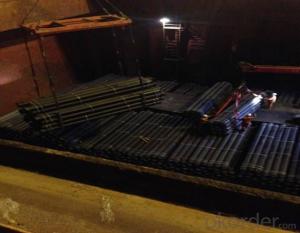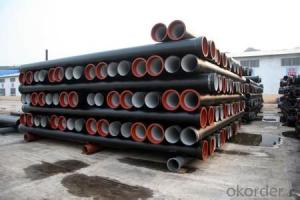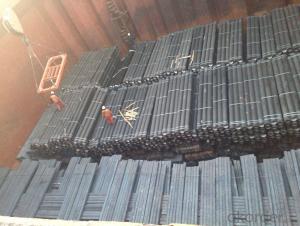DUCTILE IRON PIPE K9 DN1400
- Loading Port:
- China Main Port
- Payment Terms:
- TT OR LC
- Min Order Qty:
- -
- Supply Capability:
- -
OKorder Service Pledge
OKorder Financial Service
You Might Also Like
Ductile Iron Cast Pipe is without any defects compare with tradition casting tech, which has many advantages particularly as follow:
(1) High density. In the "vertical upward casting" process, the melt iron of centre liquid column in center crystallizer is continuously feeding for volume shrinkage caused by condensation tube at outer circumference , which lead to be free of shrinkage porosity.
(2) High purity. When melt iron pouring, the mixed impurities such as gas, dross, sand grain which are lighter than melt iron could be eliminated at furnace mouth, its impossible to enter into the crystallizer through the channel, so the melt iron into the crystallizer is very pure.
(3) Strength with toughness. The cooling speed provided by continuous crystallizer is 30 times than sand casting and 5 times than centrifugal casting, and doesn't produce white iron, the eutectic cell volume of continuous cast iron is one eighth to one tenth compare with traditional cast iron. The density of graphite nodule in ductile iron can reach 300-700 pcs/mm2. Therefore, all reason above improve the strength and toughness of continuous cast iron.
(4) Free machining. The high speed cooling make the hardening phase (such as boride, steadite) not appear like reticular, massive or thick, but diffuse like fish bone and pane in shape, moreover, there are tiny graphite flakes inlaid hardening phase. It's free machining in BrinellHardness the range of 250-300HB. However, the Brinell Hardness of 250 is top limit to common metal materials.
(5) Uniform composition of tube wall. The convection mixing of liquid column caused by marching type drawing in crystallizer make the composition of tube wall well-distributed, and concentration gradient very little.
(6) High productivity. To the wall thickness of tube under 10mm, the speed of continuous casting is 1 meter/min, to the wall thickness of tube under 20mm, the speed of continuous casting is 0.5 meter/min, which is high efficiency that centrifugal or other casting tech couldn't reach.
- Q:Does the cast iron pipe need separate corrosion protection?
- The pipe has been antirust in the production process and can be used directly
- Q:What is the weight of ductile iron pipes?
- The weight of ductile iron pipes can vary depending on their size, thickness, and length. Typically, ductile iron pipes can range from a few pounds to several hundred pounds per linear foot.
- Q:Can ductile iron pipes be used for underground fuel storage systems?
- No, ductile iron pipes are not suitable for underground fuel storage systems. They are more commonly used for water and sewer applications due to their strength and durability in carrying liquids. Underground fuel storage systems require materials that are specifically designed to handle the corrosive nature of fuel and prevent leaks or contamination, such as double-walled fiberglass or steel tanks.
- Q:What are the common pressure ratings for ductile iron pipes?
- Common pressure ratings for ductile iron pipes vary depending on the specific application and industry standards. However, the most commonly used pressure ratings for ductile iron pipes are Class 150, Class 200, Class 250, and Class 350. Class 150 ductile iron pipes are typically used for low-pressure applications, with a working pressure of up to 150 psi (pounds per square inch). These pipes are commonly used for water distribution systems, irrigation, and gravity flow sewer systems. Class 200 ductile iron pipes have a higher working pressure of up to 200 psi. These pipes are often used for applications that require a slightly higher pressure, such as industrial water supply, fire protection systems, and wastewater treatment plants. Class 250 ductile iron pipes have a working pressure of up to 250 psi. These pipes are suitable for more demanding applications, such as high-pressure water supply systems, power plants, and municipal water distribution networks. Class 350 ductile iron pipes have the highest working pressure rating, with a maximum pressure of up to 350 psi. These pipes are typically used for heavy-duty applications, such as industrial water supply, oil and gas pipelines, and large-scale water transportation projects. It's important to note that these pressure ratings are general guidelines and may vary depending on the specific manufacturer and product specifications. Consulting industry standards and guidelines, as well as working with qualified engineers and professionals, is essential to ensure the correct pressure rating is selected for a particular ductile iron pipe application.
- Q:Are ductile iron pipes suitable for use in mining applications?
- Ductile iron pipes are well-suited for mining applications due to their unique properties. Also known as nodular cast iron, ductile iron is a type of iron that has been modified with magnesium or cerium to enhance its microstructure, resulting in increased strength and flexibility compared to traditional cast iron. These enhancements make ductile iron pipes highly resistant to impact, corrosion, and abrasion, which are common challenges in mining environments. In mining applications, ductile iron pipes find multiple uses, including water supply, slurry transportation, and ventilation systems. Their exceptional durability and resistance to wear and tear make them ideal for handling abrasive materials, chemicals, and high-pressure fluids typically encountered in mining operations. Moreover, the ability of ductile iron pipes to withstand heavy loads and external pressures makes them suitable for underground mining, where they may need to support the weight of overlying rock layers. With their high tensile strength and flexibility, ductile iron pipes help prevent pipe failure and reduce the risk of leaks or breaks, ensuring the safety and efficiency of mining operations. Furthermore, ductile iron pipes are relatively simple to install, maintain, and repair. They can be welded or joined using mechanical couplings, allowing for quick and efficient installation at mining sites. Their corrosion resistance also minimizes the need for frequent maintenance and replacement, resulting in cost savings for mining companies. Overall, the superior mechanical properties and durability of ductile iron pipes make them a reliable and practical choice for mining applications.
- Q:Are there any alternatives to ductile iron pipe for water distribution?
- Yes, there are several alternatives to ductile iron pipe for water distribution. Some common alternatives include PVC (Polyvinyl Chloride) pipes, HDPE (High-Density Polyethylene) pipes, and PEX (Cross-linked Polyethylene) pipes. Each of these alternatives has its own advantages and disadvantages in terms of cost, durability, ease of installation, and resistance to corrosion. The choice of alternative pipe material depends on factors such as the specific requirements of the water distribution system, budget constraints, and local regulations.
- Q:Can ductile iron pipes be used for agricultural applications?
- Certainly, agricultural applications can make use of ductile iron pipes. Ductile iron, being a robust and long-lasting material, possesses a corrosion-resistant property that renders it appropriate for diverse agricultural purposes. These pipes are applicable for irrigation systems, drainage systems, water supply systems, and other agricultural infrastructure projects. With their exceptional tensile strength, ductile iron pipes can endure the external pressures and stress that agricultural environments may impose. Furthermore, their prolonged lifespan lessens the necessity for frequent replacements, and they are capable of accommodating high water flow rates. Consequently, ductile iron pipes emerge as a dependable choice for agricultural applications.
- Q:What is the relationship between the mechanical properties of spheroidal graphite cast iron and its spheroidization rate?
- Poor balling and poor performance. Can do under tensile. General level three or four or more on it
- Q:Do ductile iron pipes require external protection against stray electrical currents?
- Ductile iron pipes indeed necessitate external safeguarding against stray electrical currents. The presence of such currents can induce corrosion in the pipes, resulting in premature failure and probable leakage. To counteract this, protective coatings or wraps are employed on the ductile iron pipes, creating a shield between the pipes and the electrical currents. This safeguarding measure guarantees the durability and dependability of the pipes, warding off expensive repairs and potential safety risks.
- Q:Luo what effect of ductile cast iron
- Chromium can improve the hardness, strength and wear resistance of nodular iron, and increase bainite in bainite ductile iron.
1. Manufacturer Overview |
|
|---|---|
| Location | |
| Year Established | |
| Annual Output Value | |
| Main Markets | |
| Company Certifications | |
2. Manufacturer Certificates |
|
|---|---|
| a) Certification Name | |
| Range | |
| Reference | |
| Validity Period | |
3. Manufacturer Capability |
|
|---|---|
| a)Trade Capacity | |
| Nearest Port | |
| Export Percentage | |
| No.of Employees in Trade Department | |
| Language Spoken: | |
| b)Factory Information | |
| Factory Size: | |
| No. of Production Lines | |
| Contract Manufacturing | |
| Product Price Range | |
Send your message to us
DUCTILE IRON PIPE K9 DN1400
- Loading Port:
- China Main Port
- Payment Terms:
- TT OR LC
- Min Order Qty:
- -
- Supply Capability:
- -
OKorder Service Pledge
OKorder Financial Service
Similar products
New products
Hot products
Related keywords




























